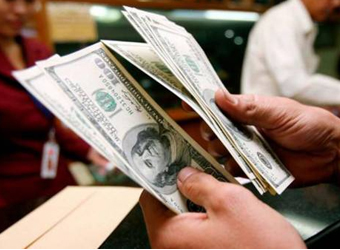The euro fell to a two-week low versus the dollar, for its biggest weekly drop in two months, as investors trimmed record high bets before a European Central Bank meeting next week where policymakers are largely expected to signal no change in policy. Commodity-linked currencies came under pressure thanks to a drop in Chinese stocks, with the Australian and New Zealand dollars hitting their lowest levels in at least two weeks.
“Higher U.S. yields have contributed to the rise in the dollar,” said Chuck Tomes, senior investment analyst at Manulife Asset Management in Boston.
U.S. two-year Treasury yields reached 2.453 percent on Friday, the highest level since September 2008 as the two-year’s spread versus two-year German Bunds grew to 302 basis points, the widest in more than three decades.
This week, Federal Reserve officials signaled further interest rate increases in 2018 based on evidence of steady U.S. growth, while the heads of the ECB and the Bank of England seemed in no rush to push rates higher in the wake of disappointing economic data out of Britain and Europe.
Still, the dollar’s overall prospect remains cloudy due to expectations of the United States’ growing trade and budget deficits, analysts said.
The dollar index, which tracks the greenback versus a basket of six currencies, rose 0.43 percent, to 90.33, after touching a near two-week high of 90.477.
The greenback gained 0.26 percent against the yen, at 107.64 yen, after touching a two-month peak of 107.85 yen.
The euro hit a two-week low of $1.2248, for a weekly drop of 0.39 percent, its steepest weekly fall in two months.
Expectations have grown that ECB policymakers may take another small step in exiting the bank’s ultra-easy monetary policy after dropping a long-standing pledge to increase bond buying if needed at its meeting in March.
On Friday, ECB President Mario Draghi told central bankers and ministers at an event in Washington that the 19-nation euro zone has been expanding robustly and needs strong global growth and open trade for the expansion to continue. But some analysts doubt the ECB would signal further changes in policy next week.
“The speed of euro zone activity has declined after the very strong activity we had seen in 2017,” said Ugo Lancioni, head of currency management with Neuberger Berman in London. “The ECB may be cautious.”
Sterling shed 0.54 percent to $1.4014, leading to a weekly loss of 1.4 percent, which would be its biggest in 10 weeks.
Sterling has fallen on weaker-than-expected inflation and retail sales data and comments from BOE Governor Mark Carney on Thursday, which traders interpreted as the BOE’s being less committed to raising rates in May due to recent “mixed” data. Source: Reuters
Source: Reuters
